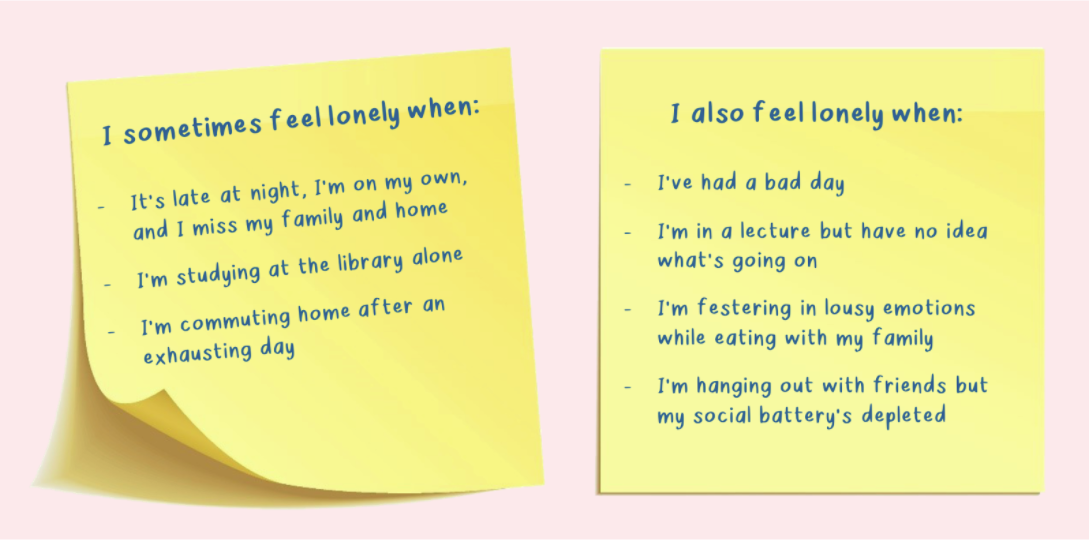Let’s talk about loneliness
Human beings are social creatures. Introverted or extroverted, we seek and need some level of human interaction to survive (and thrive) – that’s why being lonely is a universal and very human experience. With loneliness, our propensity to ruminate over how it makes us feel complicates our identification and/or understanding of its origin.
In this article, we’ll explore what might constitute and cause loneliness, go through the repercussions of being lonely (particularly for extended periods), and offer a few tips on how you can deal with loneliness.
What is loneliness?
A quick Google search for the definition of loneliness will immediately bring up ‘sadness because one has no friends or company’. If it were up to me, though, my definition would be closer to something like ‘the human sensation of isolation’, for a few reasons:
Loneliness and being alone are definitely not synonymous;
It is natural to feel lonely sometimes; and
Understanding (1) and (2) in their totality make loneliness a common human experience.
We can feel lonely when we’re surrounded by people, even (and sometimes, especially) those we love. Isolation can stem from feeling misunderstood, unheard, tired, unwanted; in short, the weight of living life can be deeply alienating, and because it is so difficult to articulate such an abstract state of mind, it becomes a battle you perceive to be fighting entirely on your own.
What can happen when I’m lonely?
Loneliness isn’t ‘just a feeling’ and it can affect a person in a plethora of ways, some more palpable and damaging than others.
From an emotional or mental perspective, feelings of uncertainty, anxiety, and negativity invade — and sometimes, before you realise it, your thoughts and emotions spiral. It might seem counterintuitive, but personally, when I get lonely, I tend to isolate myself as I lack the energy to seek comfort in others, all while recognising that I’m perpetuating my negative state of being.
There are physical implications that accompany loneliness too. Verywell Mind cites research that attributes loneliness and the emotional stress it entails to depressed immunity, poorer health and well-being, and even manifestations of bodily pain.
Your brain is an organ, and it can fall sick – this is how over time, protracted periods of loneliness and the isolation we perceive can make ripples in our lives by gradually straining our relationships, mental health/emotional wellbeing, and physical health.
How can I deal with loneliness?
There are two equally-important approaches to dealing with loneliness: taking a precautionary stance, and/or dealing with loneliness once it arises. Although prevention is better than cure, we inevitably feel lonely sometimes, and being able to cope with it upon arrival can help to minimise the odds of it lingering and aggravating.
Loneliness isn’t one-dimensional. We all feel lonely for different reasons, and exploring these are a good starting point for how we can mediate them. It’s worthwhile to sit in with yourself to evaluate triggers for your loneliness, especially if the episodes recur – and from there, figure out what measures work best for you.
1. Reach out
Physical isolation is often a catalyst for loneliness as it leaves us grappling with why we’re alone and prompt feelings of social inadequacy. As we’re now especially prone to unconsciously distancing ourselves from others, maintaining existing relationships can make all the difference, as it can remind you of the connections you already have. You can also explore the multitude of support platforms and friendship channels available online. Of course, the option of seeing a therapist is always open, too.
Some of us don’t crave human interaction (and that’s fine!) but we do need to have some form of metaphorical warmth in our lives. You could consider volunteering at an animal shelter as adopting a pet is a big commitment. Collecting items you like (such as crystals, plants, or art) can fill up personal space and spark joy on sight.
2. Take a break & distract yourself
Sometimes, stress can’t be avoided as it comes in tandem with life, but regardless, it is essential to slow down and practice self-care when you need to. Aside from indulging in what you enjoy, don’t neglect to look after yourself: eat healthily, exercise regularly, go outdoors, and get enough rest. If you’re stressed out by social media, you can take a break from that too! These will help you reconnect with yourself so you can better engage with the people around you.
When you’re bored, you leave room for negativity to emerge and dominate. Keep busy: try volunteering to occupy your time meaningfully, pick up a new hobby (I’ve gotten into making beaded jewellery in recent months!), and try that new sport or class you’ve been eyeing.
3. Look inwards
Grief, sadness, numbness, mediocrity, existentialism, isolation, fear… all of these create a lousy state of mind that perpetuates and participates in negative cycles of loneliness. It’s much harder to avoid these, as even the aforementioned methods of diversion can fail.
Begin by acknowledging and validating the way you feel and letting go of whatever’s out of your control. Then, tell yourself that you hold power in your life and that you are important and loved.
Remember that you aren’t alone, even when you feel lonely. Loneliness is a perfectly normal emotion that shows just how human you are: what’s important is not to let yourself fester in that loneliness or allow the negativity to overpower you. Have faith that things can and will get better, and know that you can always seek help and comfort in others.

